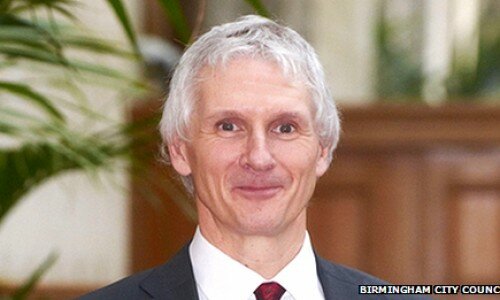
Rogers to play key role in national move to merge council and NHS budgets
The chief executive of Birmingham city council will play a leading role in delivering a bold plan to merge local authority and health service budgets.
Mark Rogers is to join other national experts in devising ways in which council social care departments can work in partnership with hospitals, sharing income streams and improving services for vulnerable people.
Birmingham and Solihull is one of 44 “footprint areas” across the country that will bring local health and care leaders, organisations and communities together to develop blueprints for improved health, care and finances over the next five years, delivering the NHS .
Delivering improved working arrangements between councils and the NHS will be vital for Birmingham city council which hopes to save £90 million by 2020 through closer co-operation with the health sector, in particular by cutting out duplication.
Senior leaders who will be leading this work have been confirmed today, with broadly equal representation from clinical commissioning groups and from hospitals and other providers of care, as well as some key figures from local authorities, recognising the need for local systems to work in partnership. They include:
Dr Amanda Doyle OBE, GP, Chief Clinical Officer of NHS Blackpool Clinical Commissioning Group and Co-Chair of NHS Clinical Commissioners (Lancashire and South Cumbria footprint)
Sir Andrew Morris, Chief Executive of Frimley Health NHS Foundation Trust (Frimley Health footprint)
Angela Pedder OBE, Chief Executive of the Royal Devon & Exeter NHS Foundation Trust (Devon footprint)
David Sloman, Chief Executive of the Royal Free London NHS Foundation Trust (North Central London footprint)
David Smith, Chief Executive of NHS Oxfordshire Clinical Commissioning Group (Buckinghamshire, Oxfordshire and Berkshire West footprint)
Sir Howard Bernstein, Chief Executive of Manchester City Council (Greater Manchester footprint)
Mark Rogers, Chief Executive of Birmingham City Council and President of the Society of Local Authority Chief Executives (Birmingham and Solihull footprint), and
Toby Sanders, Accountable Officer of NHS West Leicestershire Clinical Commissioning Group (Leicester, Leicestershire and Rutland footprint).
Mr Rogers, leader for Birmingham and Solihull footprint, said he wanted to deliver “seismic changes” through closer co-operation with the NHS.
He added:
I am pleased that through a natural consensus, my council and NHS colleagues across Solihull and Birmingham have shown faith and confidence in me to take and develop a system leadership role across our shared places.
This will give me the opportunity to see if we can make some pretty seismic changes to the way we address the needs of local people at a time when quality, service models and finances are all under immense pressure. I look forward to working collaboratively with the many organisations who can – and must – act together and in harmony to improve our citizens’ lives.
Similar Articles
Time running out to get a slice of £9m Greater Birmingham housing fund 3
Developers have just one week to stake a claim for a share of a £9 million
Greater Birmingham skills coaching scheme takes 8,000 people off the dole 1
More than 8,000 unemployed people in the Greater Birmingham area have been found work in
Re-opening Moseley-Camp Hill railway a job for WMCA, say Liberal Democrats 6
Liberal Democrats are urging the new West Midlands Combined Authority to show leadership by heading
The local elections in Greater Birmingham – minus Birmingham 5
Chris Game, from the University of Birmingham's Institute of Local Government Studies, fills in the gaps
All systems go for combined authority to transform West Midlands’ economy 17
The West Midlands Combined Authority is on course to start operating in a little over










